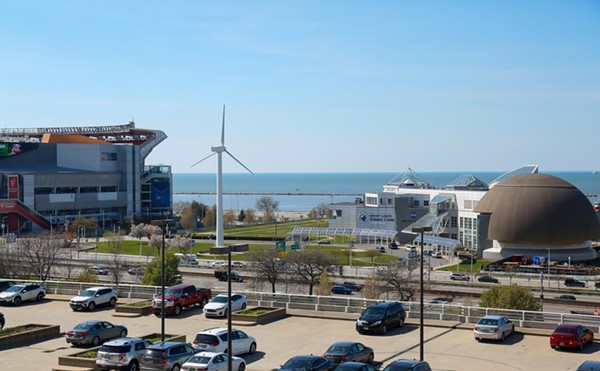Interim President Wilma Mishoe has done what she can to build and restore trust. She isn't sure where the current presidential search stands, beyond the fact that it's delayed. "That's entirely in the hands of the board," she told me.
But the board, along with the "very much engaged" AME Church, and Wilberforce administration, has outsourced its media relations to a firm called Trevelino Keller — the fourth-fastest growing PR firm in the world, by its own claims — who, from headquarters in Atlanta, insist that now's just not a very good time for interviews.
Terry Futrell, though, Wilberforce's soft-spoken basketball coach and athletic director-by-default, has been so impressed with Mishoe and her leadership style that he hopes she stays.
"She recognizes the value of sports and extracurriculars," says Futrell, a warm and religious man, in his office at the Alumni Multiplex across the street. He says that he's been reduced to a department of one, and that prior administrations were almost hostile, taking so much funding away that it became nearly impossible to recruit athletes with scholarships or even to provide equipment and amenities for his players. Men's and women's basketball are currently the only sports offered at Wilberforce, but next year Futrell's been tasked with re-instituting programs in cross country and golf.
(A pragmatic junior named Antoine, from Cincinnati, when I chatted with him in Wolfe the next day, gestured to campus and asked rhetorically where the golf course was).
"I just hope that a new president sees the value too," Futrell says, "that sports — because they keep the students engaged and give them something to root for — are important not only to bring students here, but for retention."
The guy who was presumed to be tapped for the president position — Dwyane Smith, an administrator and multicultural specialist from Harris-Stowe University in St. Louis — confirmed via email that he's no longer in the running.
Standing in Wolfe, walking the row of photos as a sort of historical tour, it's obvious that a dynamic leader can singlehandedly, by the force of his or her will and charisma, alter the culture and prospects of an institution in distress.
***
Just ask Michael Sorrel. He knows a thing or two about the plights of HBCUs and the creative energy necessary to rustle up major contributions. Sorrel's the president of Paul Quinn College, in south Dallas. Paul Quinn's another HBCU under the aegis of the African Methodist Episcopal Church, and in 2009, it lost its accreditation for reasons very similar to those currently laying siege to Wilberforce.
Sorrel, an alum of Oberlin College and Duke Law School, told me he met Paul Quinn graduates at a weekly basketball game at the Dallas YMCA after he'd been lassoed to Texas by a prominent firm — Sorrel worked in corporate securities law. He found a deep community of friends among the Paul Quinn community, and said that he hated seeing people he respected affiliated with a university that, at least in the public eye, wasn't thought highly of.
It wasn't long before he was asked to join the board. And it wasn't long thereafter that he became an unhappy board member. "We didn't aim high enough," he told me. "And that's a big problem at HBCUs across the board."
By phone, Sorrel chatted about the challenges of fundraising at a school like Wilberforce.
"People always point to recruitment and fundraising because they intuitively make the most sense," he said. "I think the problem is a different one. You have nothing to sell. What are you selling? If you have a vision that is achievable and people look at you and think you can accomplish it, they will give you money. The problem is, institutions that get in trouble aren't wired for short-term fundraising success. There's a process. We call it creating an investment mentality."
In Sorrel's case, that meant acknowledging first and foremost that his students were his products — students who didn't, at that time, convey to investors that they were a good bet, Sorrel said — and by enlisting their aid in fundraising initiatives.
Sorrel's innovative idea was to establish a non-negotiable "business professional" campus dress code at Paul Quinn. The business-savvy, PR-friendly president took to the airwaves asking for donations not of cash, but of suits and dress shoes for his students.
"The secret was that the dress code was a Trojan Horse for building fundraising capacity," Sorrel said. "The clothing drive created a network of donors that we could return to, and by the way we could gauge by the types of clothes people sent in just what their capacity to give might be."
The reason why Sorrel's outside-the-box fundraising thinking is so critical is because at HBCUs, the rate of giving among alumni is much lower than at other colleges and universities. Much of that has to do with the fact that many of the students are (still) the first or among the first to attend college in their families. The idea of giving back hasn't yet become part of the tradition.
Carole Bernardino, the newly minted alumni affairs director at Wilberforce, says she always stresses that for alumni, giving back should be an obligation, just like church.
"I say to them that whatever we could do and whatever we should do, we must do, for WU," Bernardino says.











